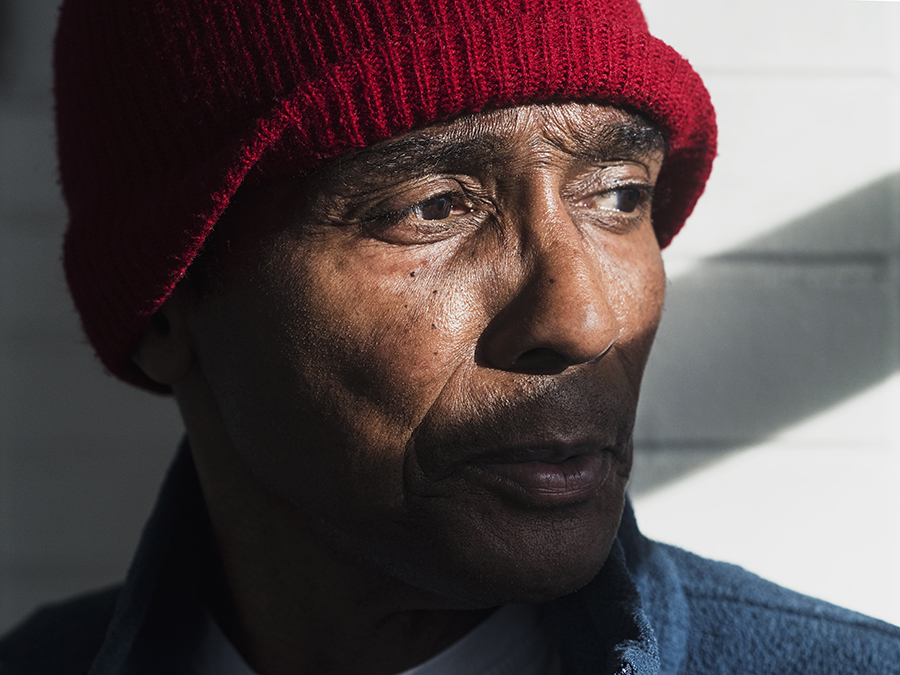
A new gallery in the Rincker Library puts words and pictures together to share the stories of veterans and refugees as captured by CUW social work students.
It’s been said that “One picture is worth a thousand words.” “But I’ve never believed that,” says Paul Calhoun, renowned photographer and assistant professor of art at CUW. Sometimes there’s much more to a story than a picture alone can tell.
That’s the idea behind the new gallery going up in CUW’s Rincker Library. It features a collection of portraits by Calhoun and essays by social work students, who interviewed the subjects and wrote up their stories. The subjects are veterans; a gallery going up at a later date will feature refugees. What the groups have in common is that both face challenges fitting into and feeling at home in our society.
Words and pictures
Last Veterans Day, students in CUW’s social work program—at the direction of Dr. Sarah Collins, director of the Master of Social Work program—spent time interviewing veterans at Vets Place Central in Milwaukee. Later they interviewed student refugees at the Milwaukee School of the Arts. The students wrote essays about their subjects, which hang in the gallery alongside Calhoun’s portraits.
Calhoun and Collins have vastly different backgrounds, but they share an interest in helping these groups. Calhoun has traveled the world photographing various people groups experiencing oppression and hardship. Collins, originally from Chicago, has lived and worked as a teacher and social worker in Alaska, Portland, Oregon, and several South American countries.
When her students work with and interview veterans, they learn valuable intake skills while also growing more comfortable with people outside their normal social and cultural circles. The veterans benefit by getting a chance to tell their stories and feel appreciated for their service to our country.

“It’s about learning how to engage, learning how to ask questions, and learning how to start to write that up, but also engaging and understanding differences in diversity,” Collins said. “It’s also about learning what services these veterans have received, or haven’t received, and how social workers can help in that area.”
The eyes of the storm
Together, the photos and essays make a powerful statement about what these different groups have had to deal with. Calhoun is an expert at drawing you in to his subjects through his use of light, shadow, and texture. Most of the time, it’s all about the eyes, such as with on particular subject who left a lasting impression:
I photographed a young refugee woman at the High School of the Arts. She wore a face covering. Her face was covered, but she was always smiling, always. You could just see it in her eyes. That’s the only way you could recognize it. So I got to know her a little bit and I asked her what kind of a student she was. She said, “Well, I’m a four-point student. I’m going to nursing school next year.”
Then she said, “But I can only go to school half days now because my mother has PTSD.” And then I guess I was a little nosy, I said, “Well, why does she have PTSD?” And she said—she was from Myanmar—she said her mother saw a number of friends and relatives killed there. And I said, “How did your family manage to get out?” She said, “Well, there was a Buddhist monk who managed to hide us in a Buddhist temple. And when things died down, we escaped and left. And when the government found out about what he had done, they killed him.”
But what was most interesting to me is, here is a person who’s gone through—she came here when she was eight—she’s gone through significant trauma and still has this incredible attitude about life, which I find remarkable. And that comes through in every photograph I took of her. It’s her eyes. Her eyes are just sparkling, you know?
To see more of Calhoun’s work and read the essays written by the social work students, visit the Rincker Library on the CUW campus during regular hours.
Want in?
Concordia University Wisconsin is a Lutheran higher education community committed to helping students develop in mind, body, and spirit for service to Christ in the Church and the world. To learn more about CUW’s Bachelor of Social Work program, click on the link below.